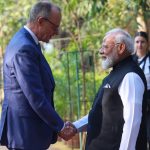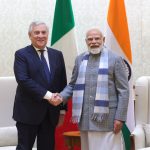 BENAULIM (GOA): Taking a realistic and long-term view of their burgeoning but challenging relationship, India and China have decided to adopt an incremental approach to resolving contentious issues like the UN proscription of international terrorist Masood Azhar and New Delhi’s membership of the Nuclear Suppliers Group, without letting these affect the larger relationship, bristling with possibilities.
BENAULIM (GOA): Taking a realistic and long-term view of their burgeoning but challenging relationship, India and China have decided to adopt an incremental approach to resolving contentious issues like the UN proscription of international terrorist Masood Azhar and New Delhi’s membership of the Nuclear Suppliers Group, without letting these affect the larger relationship, bristling with possibilities.
In their third meeting this year, India’s Prime Minister Narendra Modi and Chinese President Xi Jinping discussed key issues, including terrorism, NSG and enhancing trade and investment, that have a direct bearing on the future trajectory of the relationship between the two Asian giants.
As expected, there were no breakthroughs on the persisting impasse on the NSG and the Masood Azhar issue, but a sobering realisation of each other’s core concerns and interests. The tone of the talks at the Taj Exotica resort in Benaulim was affirmative and positive unlike bitterness and acrimony that have marked the portrayal of India-China relations in recent months.
In a subtle way, Mr Modi exhorted China to adopt a non-segmented approach to terrorism by stressing that the two countries “can’t afford to have differences on the issue of terrorism.” “Both sides emphasised that they must increase coordination and look for common ground,” said Vikas Swarup, the spokesperson of India’s external affairs ministry.
Despite differences over the India-backed initiative to sanction Masood Azhar in UNSC, both India and China empahsised on intensifying counter-terror cooperation.
Mr Modi conveyed to the Chinese leader that both India and China had been victims of terrorism which was a scourge afflicting the entire region. President Xi shared Mr Modi’s concerns and pitched for enhancing counter-terror and security cooperation with India. Reliable sources said that while anti-terror cooperation will become more important in India-China relations, Beijing should use its leverage over Islamabad to persuade its all-weather ally to abandon cross-border terrorism against India.
NSG: Keep talking
Predictably, there was no breakthrough on India’s NSG membership, but there were signs of progress as both sides were hopeful about the next round of talks between officials dealing with nuclear issues. Our aim is to narrow down differences, said Mr Swarup. China has advocated a “two-step” formula for membership of non-NPT signatories which envisages that the NSG should first reach an agreement on a non-discriminatory formula applicable to all the non-NPT states, and to take up country-specific membership issues at the second stage. This is seen by India as a diversionary ploy to stall and delay India’s membership of the global cartel that controls the flow of atomic materials and equipment.
The Way Ahead: It’s economics!
Looking ahead, India and China are set to focus on ramping up the economic relationship, which has emerged a key pillar underpinning the crucial relationship. In this context, President Xi called for co-operation between India and China in railways, industrial parks, vocational and skill training, space and ICT. This “economics first” approach suggests realism and pragmatism, but to focus only on the economic relationship has its limitations. The real breakthrough that will release pent-up energies of the India-China relationship will be Beijing’s explicit support for India’s global aspirations, including membership of the NSG and New Delhi’s long-standing claim for a permanent seat in the UN Security Council.
Author Profile

- Manish Chand is Founder and Editor-in-Chief of India Writes Network (www.indiawrites.org) and India and World, a pioneering magazine focused on international affairs. He is CEO, Centre for Global India Insights, an India-based think tank focused on global affairs.
Latest entries
 India and the WorldJanuary 31, 2026Palestinian minister bats for mediatory role for India in ending Gaza conflict
India and the WorldJanuary 31, 2026Palestinian minister bats for mediatory role for India in ending Gaza conflict India and the WorldJanuary 13, 2026India, Germany raise the bar for defence, economic ties
India and the WorldJanuary 13, 2026India, Germany raise the bar for defence, economic ties India and the WorldDecember 12, 2025India-Italy bonding: Tajani’s visit raises the bar for business, maritime ties
India and the WorldDecember 12, 2025India-Italy bonding: Tajani’s visit raises the bar for business, maritime ties In ConversationNovember 26, 2025G20 is a Force for global Good
In ConversationNovember 26, 2025G20 is a Force for global Good







